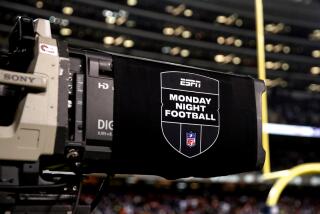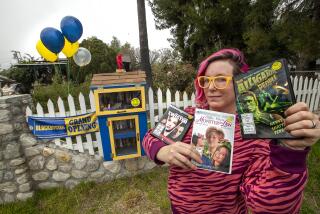Blockbuster, in Pact With Enron, to Offer Demand-Video
- Share via
Blockbuster Inc., the biggest name in movie rentals, expects to begin marketing a video-on-demand service by year-end in a partnership with Enron Corp., the nation’s largest energy trader, which over the last three years has built a state-of-the-art fiber-optic network that reaches every city in the country.
The 20-year partnership, announced Wednesday, will allow consumers who already have high-speed Internet access and a special TV set-top box to order movies over their TVs and PCs at their convenience.
Only a couple of million households today have high-speed Internet access, but market researchers expect that number to expand as cost of the service falls and nifty applications such as video-on-demand (VOD) are developed and rolled out.
Blockbuster is trying to capitalize on the race by cable, satellite and phone companies to unveil VOD offerings by leveraging its household name, its 65 million customers, and its entrenched relationship with movie studios.
These services threaten to erode Blockbuster’s core rental business, as customers order their movies with a click of the remote instead of driving to the store.
For Enron, the alliance underscores its commitment to becoming a major player in the emerging market for broadband services such as video streaming and conferencing that require high-capacity and high-speed lines to work well.
The company’s stock has shot up 63% this year because of investor enthusiasm for its plan to trade broadband capacity, as it does oil and gas, in an effort to lower prices and to provide these advanced services over its newly constructed network.
Although other content suppliers have used Enron’s network to stream video over the Internet, the company says the Blockbuster alliance is its biggest such partnership yet--and is a sign of things to come.
“Enron is the leader of the pack and I think this could be the beginning of streaming of content over its network,” said Ron Barone, an analyst at PaineWebber Inc. who covers Enron. “Signing a company like Blockbuster is a reassuring signal of the validity of their strategy.”
Though the partners have not determined a price, Blockbuster Chief Executive John Antioco said the service would cost more than renting the movies at its stores because of the added convenience.
He said that when the company launches the service in at least two undisclosed cities by the end of the year, customers will be able to choose from a library of 300 to 500 titles, with games and other services available in months ahead.
The titles won’t be fresh from the box office but rather those that customers can already order through their cable or satellite providers as pay-per-view selections. Antioco says the added control of VOD, however, should vastly expand the pay-per-view market, which generates revenues of about $1 billion and is dwarfed by the $10-billion video rental business because it has been poorly marketed and lacks convenience.
Unlike pay-per-view television service, which allows viewers to watch movies at staggered start times throughout the day, VOD gives instant gratification: programming at any time any day, with rewind, fast-forward and other VCR functionality.
Though video-on-demand has been feasible--and promised by cable operators--for years, only recently has it become economically practical. Digital technologies and declining prices for the servers, which store movie libraries at local hubs, have driven down the costs.
The partners are the latest entrants in an escalating battle among cable, satellite and phone companies to sell customers a bundle of telecommunications services including high-speed Internet access, interactive television and phone services.
“Blockbuster is desperate to figure out a survival strategy,” said Tom Eagan, an analyst at PaineWebber who covers satellite and cable companies.
Analysts expect VOD offerings from cable and satellite to erode the $5-billion that Blockbuster takes in annually from renting movies.
Enron is trying to capitalize on its experience operating networks of all types. Enron, which has ranked at the top of Fortune magazine’s list of the nation’s most admired companies for the last five years, revolutionized the gas pipeline business by forcing “open access,” allowing space on the system to be traded like a commodity, driving down natural gas prices for consumers.
Enron already buys and sells broadband space from cable operators and other network operators in similar fashion. The hope is that prices will fall accordingly.
As part of this agreement, Enron will encode and stream the movies over its network and store them on servers. In January, the company struck a joint venture with Sun Microsystems under which the computer maker agreed to supply 18,000 servers to Enron.
Those servers will be installed at Blockbuster locations as well as near customers’ homes at the facilities of the partnerships’ other affiliates. To provide the “last mile” of transport to customers’ homes, Enron and Blockbuster have signed on as affiliates several providers of high-speed access, including SBC Communications, Qwest and Covad. These companies are peddling high-speed Internet services and need a VOD solution to keep up with the cable industry, which has more high-speed customers.
In addition to high-speed access, customers must also lease or buy a set-top decoder box that will be available at Blockbuster stores or from their high-speed provider. Once they have the equipment, movies will be transported from Blockbuster stores over Enron’s private network to a third partner such as SBC and on to the customers, bypassing any public network that could introduce security problems, Antioco says.
Blockbuster said the service would be available in at least two cities by the end of the year, with expanded availability in 2001. Within weeks, it will name several U.S. cities in which it will begin selling the service.
“We believe that VOD has the potential to be a $3-billion market in five years and we don’t see why we can’t have a 35% to 50% share of the market,” Antioco said. “Cable is deploying in trials but this partnership has the potential to be national in scope.”
More to Read
Inside the business of entertainment
The Wide Shot brings you news, analysis and insights on everything from streaming wars to production — and what it all means for the future.
You may occasionally receive promotional content from the Los Angeles Times.










